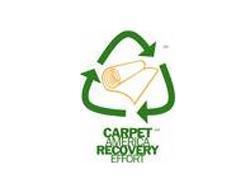CARE Says Carpet Recycling Slowed in 2008
Landsdowne,VA, April 29, 2009--Figures for 2008 released this week by the by the Carpet America Recovery Effort (CARE) show a reduction in the recycling and diversion of post-consumer carpet, compared to 2007 levels.
CARE's 2008 Annual Report, presented at the organization's seventh Annual Conference held April 28 through May 1 at the National Conference Center in Landsdowne, Virginia, showed that 243.4 million pounds of post-consumer carpet were recycled and 292.4 million pounds were diverted from landfills in 2008. These figures represent an 11.4 percent decrease in recycling and a .8 percent decrease in diversion compared to 2007.
However, according to CARE Board Chairman Frank Hurd, the amount of decrease was less than expected by the group, especially in light of profoundly negative business results reported by other industries in 2008, and given the tough economic environment currently faced by U.S. businesses.
"To put this in perspective," Hurd said, "businesses suffered unprecedented downturns in 2008. While we would all have preferred an increase in diversion and recycling, CARE members should be proud of all that they have accomplished this year."
The downturn made consumers less likely to purchase both durable and discretionary items, items that typically use postconsumer carpet as a source of recycled content. CARE expects continuing market challenges in 2009, without significant improvement until 2010.
In a clearly positive development, new data collected for the first time in CARE's 2008 Member Survey shows carpet collectors report 1,100 employees involved directly in carpet recycling, which translates into an additional 2,200 indirect jobs created in local communities. "This level of employment contributes significant dollars for local and state economies where these jobs are located," said CARE executive director Georgina Sikorski.
The amount of carpet diverted from the landfill in 2008 translated to over 238,000 tons of greenhouse emissions from the atmosphere, which is equivalent to over 2 million barrels of oil not being burned, and 728,000 pine trees storing carbon for one year.
